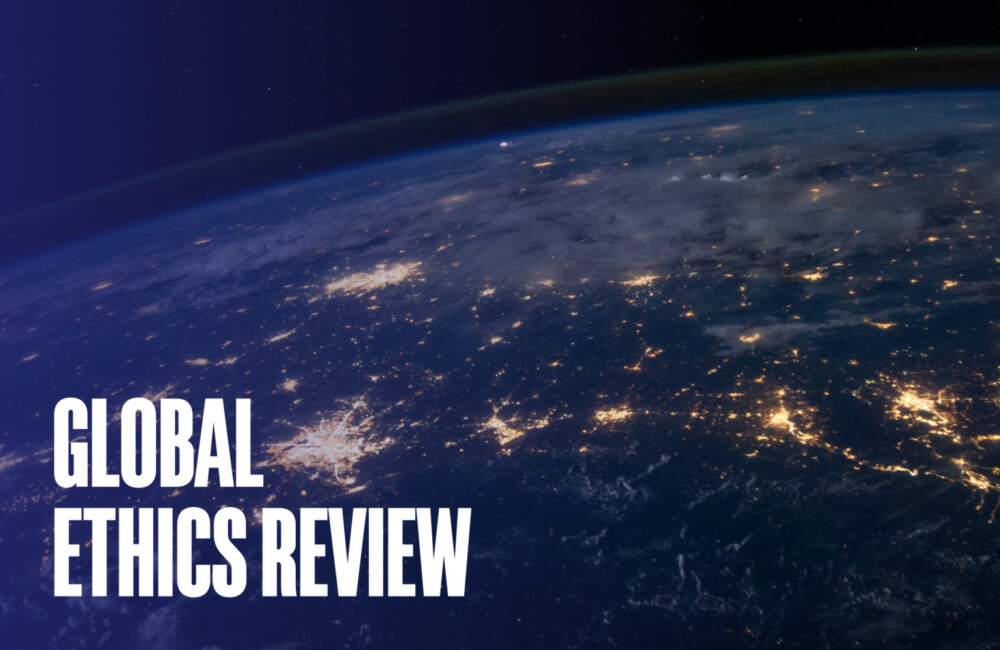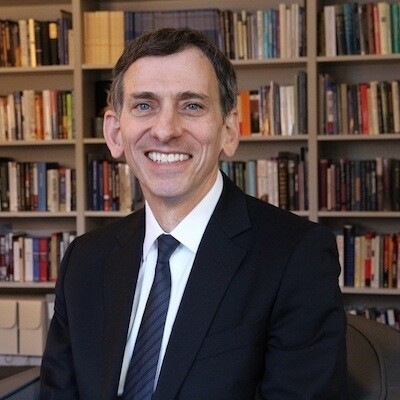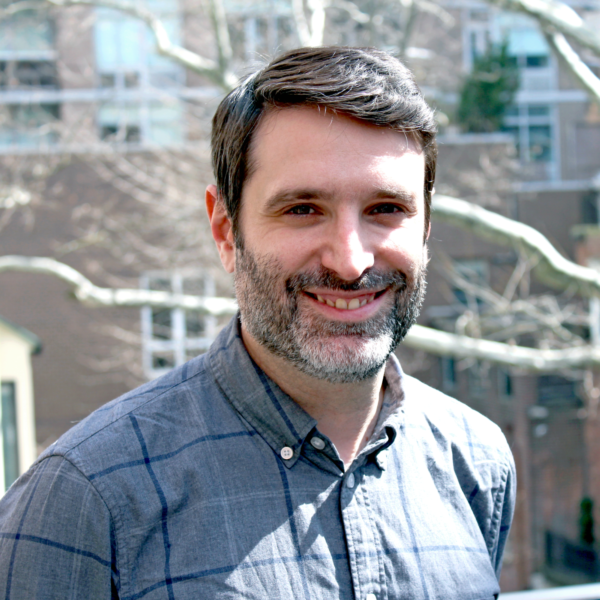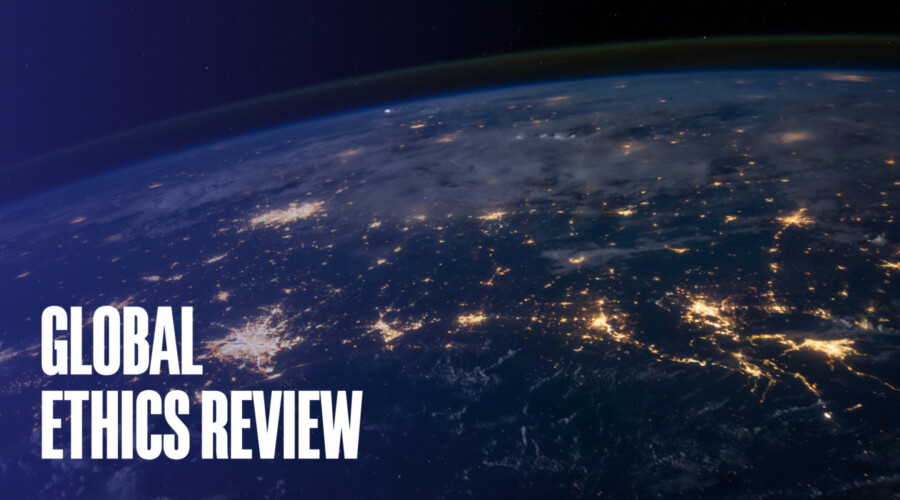In this new podcast series, we'll be connecting Carnegie Council's work and current events with our senior fellows, senior staff, and friends of our organization. In this episode, we look back on one year of the COVID-19 pandemic and its effect on international relations, with clips of events from Spring 2020 and interviews with Senior Fellow Nikolas Gvosdev and Carnegie Council President Joel Rosenthal. Has the pandemic increased cooperation or competition? What's the status of China after this past year?
ALEX WOODSON: Welcome to Global Ethics Review. I'm Alex Woodson from Carnegie Council, the world's catalyst for ethical action.
In this podcast series, we'll be connecting Carnegie Council's work and current events with our senior fellows, senior staff, and friends of our organization. You'll hear from leading experts on artificial intelligence and technology, migration, climate change governance, and U.S. foreign policy and global engagement.
Today, we're looking at one year of the COVID-19 pandemic and how it has changed international relations. Has it increased cooperation or competition? What are some of the issues we should be thinking in regards to trans-Atlantic and inter-European relationships? What's the status of China after this past year?
Next week, in part two, we'll be taking a closer look at the United States and how the Biden administration has operated in early 2021. After four years of Trump and a disastrous response to COVID-19, is the U.S. still seen as a leader by its allies?
To try to answer these big questions, we'll share some clips from Carnegie Council events last spring. And then I'll be speaking with our Senior Fellow Nikolas Gvosdev, also a professor at the U.S. Naval War College, and Carnegie Council President Joel Rosenthal.
The first clip is from a virtual event with Gvosdev and Rosenthal on April 17, 2020 titled "Fractured Globalization & Dissolving Ethics." As you'll hear, Gvosdev was quite pessimistic about the prospects for solidarity in the early days of the pandemic, especially when it came to Europe and the United States.
NIKOLAS GVOSDEV: What you had, at least in those first critical weeks in February and March, was countries within the Euro-Atlantic world not only simply not rendering aid—the first ethic of solidarity should be: "You're in trouble. I have something. I can help you, so I will give you masks, ventilators, spare capacity. We will deploy people to help you"—you had countries beginning to take steps that actively injured other members of the community, which is: "We're not simply going to give you aid, but we will take steps in our own country that are going to actively cause the citizens of your country greater harm or greater tragedy."
When you have the countervailing ethic of sovereignty—and it's a natural reaction—on the one hand, you have the ethic of solidarity—what affects you affects me—and then you have the ethic of sovereignty, which says the price of sovereignty, the price of self-determination is that you take responsibility for yourself and for your own, and therefore you don't have a right to make claims on others or those claims lessen against the claims of my own citizens.
So you saw borders going up, checkpoints going up, restrictions, and then in the financial area, countries in the European Union harder hit by the pandemic asking for the floating of what they were calling "corona bonds" and more fiscally conservative countries in the Union being less likely to do it. We had then across the Atlantic competition for resources, competition to acquire patents and assets, saying: "Well, if I acquire this asset or I acquire this company that's working on something, then they're going to do it for me and not for you."
All of this creates damage to this ethic of solidarity, and this is why I'm concerned as we move forward that you already have people saying: "Well, this pandemic is a problem and it's a crisis, but then it'll pass, and somehow we're going to go back to the way things were pre-2020."
My sense is that when you damage the ethic of solidarity it's not that you can't reconcile, but you have opened up the possibility for countries and populations to say: "The last time we had a problem others did not have our backs. Therefore, we should be more concerned and reticent to so quickly offer aid in the future, or maybe that aid isn't dependable, so we shouldn't prepare or expect our partners to be able to do that," and you begin to erode those bonds. It's like termites working their way through the frame of a house. They begin to undermine it, and then perhaps that house isn't as stable for the future.
Looking at what's happening with the fracturing of the Euro-Atlantic community; those fractures are there. They have opened up. This doesn't mean that they're irreparable, that they can't be patched over, that you can't go in and put in some sealant and try to put the structure back together again, but the cracks have opened up. They have weakened that tie of solidarity.
Certainly in the case of Italy in those first critical weeks when it was Chinese and Russian efforts—even if they were modest, even if they were largely symbolic—that had an impact, and then to turn around later on and say: "Well, Italy you must now do certain things vis-à-vis Russia because your partners in Poland and Romania would like to see certain things happen vis-à-vis Russia, and European solidarity," you may find that the Italians say, "Solidarity only goes so far, and we're going to do things that benefit us." The trans-Atlantic relationship, even if there is a change of administration this November, the idea that you can just magically pretend that these things haven't happened and you reset to an earlier stage, I don't think that happens either.
Just to wrap up here, this is a case where the ethical and strategic questions really merge together around this question of solidarity. As the ethical basis of solidarity has been damaged within the Euro-Atlantic community there will be strategic consequences.
ALEX WOODSON: In late May 2020, Gvosdev and I recorded a podcast with Amitai Etzioni, university professor at The George Washington University and director of its Institute for Communitarian Policy Studies. He described this lack of solidarity in ever starker terms, highlighting the isolation of the United States.
AMITAI ETZIONI: But above all, there is an enormous difference between the rest of the world and the United States. The United States is the outlier here. Other countries seek to collaborate: Europe is seeking to collaborate with China; Israel is suddenly working with China in science and on trade; India and China, despite their tensions, are helping each other. In fact, several other countries are forming an interesting new idea, "travel bubbles," countries like the Czech Republic, New Zealand, and Israel, who are all in good shape. They allow people to travel from one country to another, but they will not open themselves up to countries like the United States, in which the virus is still running wild.
I believe there is a different picture on a scientific level and economic level, and above all between the United States and the rest of the world.
I love this country. As you will hear from my accent, I emigrated to the United States and served in the White House. I have enormous respect for the potential of this country, but currently it's conducting a policy which is disruptive to the international community, but the other countries are not following. They are increasingly collaborating with each other and with China.
ALEX WOODSON: Nearly a year later, I talked with Gvosdev and Rosenthal about where we are today when it comes to solidarity, ethics, and the ongoing pandemic.
Here's Joel Rosenthal:
JOEL ROSENTHAL: Reflecting on the year, from a cooperation-versus-conflict spectrum, I would have hoped for more on the cooperative end, more of an internationalist approach to the pandemic, but I think what we saw and what we continue to see is an assertion of the populism and nationalism that we had seen since Brexit and with the election of President Trump and other nationalist tendencies all around the world. I think this definitely shaped the way the pandemic was handled over the last year and even into this moment now, one year in.
Internationalism and international cooperation, even in the face of a collective threat like a pandemic, still seems to be an uphill battle.
ALEX WOODSON: That is very much in line with what Nick was saying a year ago. Are you still seeing that today? Have you seen that change in any way in the past year?
JOEL ROSENTHAL: No. I think Nick was spot-on. I think that his concerns about the fading bonds of solidarity within Europe and within the West and the alliances has continued. We are seeing a fracture, if you will—maybe that's a little dramatic—but certainly a continued fraying of those bonds. It is quite natural that every country is seeking its own interests, and in the case of the pandemic that means borders, it means protection, it means acquiring vaccines for its citizens first, and the cooperative elements seem to be coming second.
ALEX WOODSON: And here's Nick Gvosdev, speaking more specifically about the situation in Europe, before we moved on to a discussion of China:
NIKOLAS GVOSDEV: I think what we are seeing is a split between much more rhetoric about cooperation, particularly in the wake of the U.S. presidential election with the new administration stressing the importance of partnerships and alliances and working together. We definitely have a rhetorical shift towards cooperation, and it is backed by some cooperative activity, working together in terms of trying to set the agenda and looking for areas for cooperation in health security and in related areas like climate.
But the underlie of competition is still very much there, because what we have seen over the last year and even continuing into 2021 is that everyone likes the rhetoric of cooperation up until the choice has to be made to cooperate and therefore to forgo something. What we have seen, particularly in the context of the European Union, is the European Union not being so anxious to export supplies of vaccine if it will diminish supplies within Europe.
We had this tossup between a Britain which has left the European Union and had ordered vaccines and the European Union trying to intervene to stop or slow down the export of vaccines to Britain. We have the question reopening in Europe of divides between wealthier and not-so-wealthy nations in Europe, and of course this is where the Russians play in, because a number of the Central European and Southern European countries that may not be able to access some of the U.S., British, German, or Belgian-produced vaccines are turning to the Russians, which then complicates efforts to try to have a unified European response to Russia, particularly when it comes to things such as human rights. We saw this in February, when the European Union essentially went for a pretty modest response to the crackdowns in Russia in the situation of Alexei Navalny. So competition is still there.
One last point is that while the Biden-Harris Administration has been signaling cooperation, when Secretary of State Tony Blinken gave his address in the first week of March, laying out the new U.S. approach, he talked about cooperation, and then he referred back to the notion, however, that whatever the United States does in the international sphere must still benefit working Americans and middle-class families here. That introduces a point of cooperation up to a point where you say that cooperation for the sake of cooperation is no longer valid. I think the pandemic opened up some of these fissures, and 2021 is not quite repairing them yet.
ALEX WOODSON: You mentioned a lot about what is happening in Europe, things that do not point toward solidarity and don't point toward cooperation. Where do you see that going? We have the vaccine, and this pandemic will be over for a lot of countries in a year or less, hopefully. Where do you see this tension in Europe leading to?
NIKOLAS GVOSDEV: I think it has already reopened and will continue to reopen questions: Where does the ethical focus for decision making lie? We saw this with the migration crisis. We saw this with the economic crisis in Europe. Even after the 2008 financial crisis and the pandemic, it continues as well.
What I mean by the "ethical framework" or foundation is: Who is owed what? Because that essentially is in a nutshell what ethics is supposed to be a guide to. Who is owed what? Are Europeans owed something by the European Union as a whole? Does that supersede the national communities to which they belong? That is, does Germany, Portugal, Italy, or Greece have a special duty to Germans, Italians, Portuguese, or Greeks before Europeans in general? Of course, when you introduce the question of "Where does humanity fit in, where does the cosmopolitan view fit in, where does it fit in in terms of either migrants or people in other parts of the world who are going to need vaccines in lesser-developed parts of the world," what obligation, say, does the European Union assume to help provide those global public goods?
I think you are going to see a reawakening of this fundamental question: Where is the focal point for ethics in terms of who is owed what within the context of the European Union?
Again, we saw these debates in the United States this past year with regard to federal versus state governments in terms of different policies related to the pandemic and so on. I think those questions are back, and I think that the answers that people came up with in the 1990s and the 2000s are going to be revisited.
ALEX WOODSON: We are speaking today on Monday, March 8. Yesterday you had an article that came out in The National Interest coauthored with Ray Takeyh, "Who Came Out On Top from the 2020 Coronavirus Year?" I want to pivot the question to China a little bit. You mentioned China in this article.
Obviously, China "beat" the coronavirus early on. They seemed to have somewhat of a normal summer. I have seen pictures of pool parties in Wuhan and all that. In terms of the transmission of the virus, they seemed to have that figured out.
But where is China today in terms of these questions about cooperation versus competition? Are nations looking up to China, saying "We should follow that approach," or are they a little concerned about China because the virus originated there? What are you seeing when you look at China right now in this sphere?
NIKOLAS GVOSDEV: I think it's important to recall where we were four years ago, in 2017. Particularly, that year at the World Economic Forum, when it was still being held in Davos, Switzerland, in the pre-pandemic era, was about China emerging as a replacement for the United States in terms of leading the international system and keeping the international system intact.
Fast-forward four years to 2021. Even though China itself may have beaten back the pandemic aspects of the coronavirus—as you mentioned, people are, at least from the images we are seeing, transitioning back to somewhat of a more normal life than perhaps we are in the United States or in Europe—but China is no longer seen in many places around the world as that automatic replacement for the United States or as a country that other countries may want to trust with a leading role in the international system.
Let me be clear about what that means. I am not saying that China is not an important country. It is an important country in terms of its economics, its scientific and technological base, and its military. It will have a seat at the table. What I am referring to, though, is the idea that countries will trust China to dispense a series of global public goods or that China will work to maintain the international system in a way that the United States ostensibly was doing through 2016 and then appears to have wavered in its commitment. The way that China handled the outbreak, the way in which its early offers of aid were very transactional in how it was offering assistance, I think has caused other countries to pause a bit.
We are not arguing in our article that the United States is coming out of the pandemic better than China in the sense of the human cost, but in the sense of the international system, China today is farther than it was in 2017 in terms of positioning itself as a replacement for the United States or as an alternate to the United States in terms of maintaining a global order that other countries are interested in taking part in.
How does China navigate that moving forward? Does China rebuild trust? Does it try to alter course?
Of course, some of this again predates the pandemic. There was already concern about how China was financing the Belt and Road and questions about Chinese lending practices. There was already a bill of particulars that was building up, but then the idea that China perhaps was not as forthcoming about the impact of the virus as it might have been, and then of course as I said how in those initial months in the spring of last year it was offering aid seemingly with some degree of strings attached I think has diminished some of the luster of Xi Jinping as the new chairman of the board of the world, which is certainly the role he had embraced and was being fêted for when he was in Davos this time four years ago.
ALEX WOODSON: Rosenthal and I also talked about the status of the United States and Europe, and then some comparisons to China, after one year of COVID-19.
I am struck by the fact that you look at the United States and the United Kingdom having bad cases of coronavirus. They didn't handle the pandemic well. A lot of other Western European countries have had their issues as well. I know Germany has had some issues lately. What does that say to you, looking at this a year later, the fact that so many countries that you thought would be able to repel the pandemic are having these tough situations? Putting aside the questions about cooperation and competition, what does it mean when you look at how these supposedly modern, developed countries have been affected by this?
JOEL ROSENTHAL: I think part of it is just the challenge that liberal societies will have with this kind of a challenge, the idea being that we privilege individual liberty, individual freedom, and when it comes to the need for collective action and solidarity it doesn't always come easily or naturally. Certainly in the United States we saw elements of this. There is a libertarian streak, which has to do with not wanting the government to tell us what to do and certainly not wanting to restrict behavior.
The other elements are related to economics, so not just the perception but the reality of closing down certain activities and then locking down in certain instances will always be difficult for the open societies, and we have not been challenged in this way in generations. In that sense it is not remarkable.
I think also the challenge for these developed democracies that you were describing as the United States, the United Kingdom, and parts of Europe, is just the challenge of governance and governments producing for their citizens. Again, we are open societies. We are market-based economies, which do privilege individual rights, freedom, liberty, and markets. Not since World War II have we needed things like the Defense Production Act, strong government intervention to meet public security collective needs, not at this level.
One year in it is a mixed record. Let's see how it looks a year from now, two years from now, when we have a little distance, and when we see the vaccines developed and distributed. Maybe it won't look quite as bad in terms of performance as you are saying. But, yes, it's not great, looking at it at the one-year anniversary, and there is a lot to continue to think about.
ALEX WOODSON: When you say that these democratic societies that value individual liberty have had a tough time with the pandemic, you look at China, which had a very serious lockdown, and it seems to have worked. They seem to be coronavirus-free now. Do you worry about what message that sends to maybe young people coming up and studying international affairs and studying politics that they see these democratic nations have basically failed in their response and a country like China and maybe some other countries you can throw in there have done a much better job because they restricted individual freedoms a lot more?
JOEL ROSENTHAL: That's a great point, and it's not just with something like the pandemic, but it also goes to other elements of public life, like building infrastructure, or, as the old saying used to go, "making the trains run on time," this idea of strong authority invested in the government to produce certain kinds of services and outcomes for society. But on the other hand, you have to understand what the price of that is, and the price of that is the giving up of individual freedom, sometimes notions of accountability, and so on.
I think a better way to think about it goes back to what Nick Gvosdev was talking about, some notion of building a sense of solidarity among publics so when you are faced with something like a pandemic, rather than have the strict government not just guidelines but requirements that you have in China of quarantine, of contact tracing, and of all these sorts of elements, wouldn't it be better to have some kind of voluntary compliance with government guidelines to do what you are asked to do? It would seem to me to be a better way moving forward than to be giving up all of your autonomy and all of your decision making to a central authority.
ALEX WOODSON: Next week, we'll be back with more clips and the rest of my interviews with Joel Rosenthal and Nick Gvosdev for part two of our look at one year of the COVID-19 pandemic and international relations. We'll be focusing on the United States and President Biden.
In the meantime, please go to carnegiecouncil.org or follow us on twitter @CarnegieCouncil.
Thanks for listening and stay safe and healthy.




